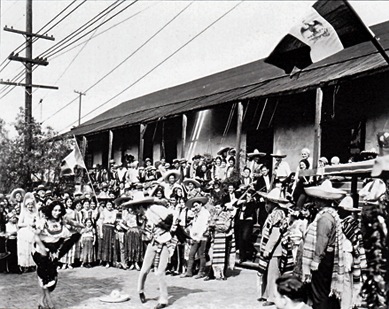It meant only that the Indian understood prevailing winds, that he used acid soil, humus and controlled moisture. I was looking forward to a session at his table, to bait of tacos and tortas compuestas, maybe with some real Capsicums, fresh from the bush and oozing their pungentpiperine.
“Hilario Villareal is very proud. He does not like Ladinos. Particularly, he does not like me. He thinks I am a big mouth.”
“About Hattiesburg, huh?”
“Yes. He thinks I am a man of guile.”
“What do you care?”
“Hilario Villareal has a daughter. Her name is Nena.”
So that was it: A Ladino, an Indian girl and her father, who didn’t like Ladinos. There was nothing for me to say, and besides, I was hungry. And then we were at Villarela’s place. Like the hotel, it was on a corner and several Indians were loafing around the door, and we made our way inside, and there was Hilario Villareal, Indian-faced and grave and with all the dignity of the Mayan, the unchanged. And there was Nena. She and her father saw us come in, and her father glanced her way and she walked out, across the patio to the family’s quarters. I didn’t get a good look at her, but what I got was good.
Tio stepped to the counter and bought a little black cigar that was strong enough to do push-ups. I went over and sat at a table, and Tio said to the proprietor, “He is my friend. He has been to Hattiesburg, Mississippi, where I went to school, as you know.”
Hilario did not even give him the courtesy of a reply. He was a heavy man, very heavy for an Indian, and although standing, he folded his hands across his stomach and looked disdainfully away from Tio. Several Indians drifted in and stood around, looking at me and at Tio, but mostly at me.
Then Hilario came over to my table, and I said, “My friend Tio tells me you have the best food in Feliz. And peppers.”
“You like Mexican food?”
“Only if it is good.”
He walked toward the kitchen, and I looked over at Tio and grinned, and then I looked around the place: the old calendars, a poster about a bullfight in Mexico City, and the clock that advertised an American soft drink.
Hilario was back much sooner than I expected, and I had an idea he wanted me to be through and both of us out of there. He had tacos and tortillas and honey. Also a little bowl of long peppers. They were Pipers officinarium. Tasty, but with about as much kick as ginger ale. The tacos were marvelous, however. And the tortillas were as thin as paper and the best I had ever eaten. I reached over and picked up one of the peppers and spoke slowly to Tio, so that they all could make out my words. “In Hatiiesburg — in Hattiesburg, Mississippi, where you went to college, we eat these for dessert, eh, Chili?”
“Only children,” he said, and tilted his cigar. “Sometimes old women who are sick, but always children.”
“With sugar and cream.” I tossed the pepper back into the bowl.
Hilario came to my table again and ate one of the peppers, smacking his lips in approval. Then he spoke to me, but did not look at me, “You like peppers?”
“Only if they are good.”
It was Tio’s cue, and he took it. He walked slowly, proudly, to my side and felt in his pocket and pulled out seventeen pesos. It wasn’t much — only about $3.40 — but I knew that it was all he had, and he put it on the table and said, “My friend Pete is the best pepper man in Feliz.”





